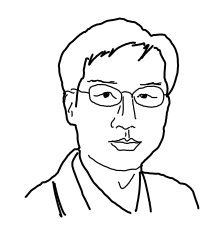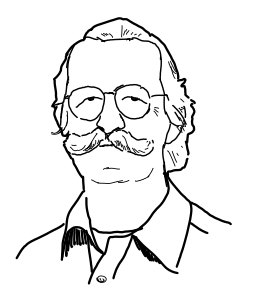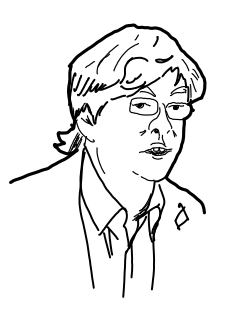Cambridge retrospective: History and Philosophy of Science
I recently concluded a year long study-abroad program at the University of Cambridge. You can read my original reasons and first impressions here.

It is the Sunday before the beginning of exams, and the weather is spectacular. Most students (except perhaps the pure historians) are dourly inside, too busy revising to take advantage of it. But I am thrust out of my den, constructed of piles of notes and past exam questions, in order to go to one final revision with our history supervisor, Mirjam. I cycle down Grange road, park my bicycle outside Ridley Hall, and am greeted to a pleasant surprise: Mirjam has elected to hold the revision outside on a cluster of park benches flanked everywhere by grass and trees, and has brought a wickerbasket containing fresh fruit, small cupcakes and other treats, and also sparkling wine and beer (perhaps not the best drink for what is ostensibly a revision, but we avail ourselves of it anyway.)

History and Philosophy of Science is a course made of two strands. They start off relatively distinct from each other: History of Science began with Galileo and the dawn of the 16th century, while Philosophy of Science began by analyzing the nature of causality. But by the end of the course, philosophical questions about quantification and quantum mechanics are couched heavily in terms of the histories of these sciences, and prevailing attitudes about the origins of western civilization being rooted in Greece and the mathematics of ancient Babylonia are analyzed with increasing philosophical flavor. The mixture of the two subjects work, and taking this course has been an incredibly rich experience. (At times, I even wish we had been asked to write more than one essay a week—something that would be pretty unheard of for an MIT humanities class.)
It was also hard work. Especially in history, where my initial essays had a rocky start due to my misunderstanding of how I was supposed to be synthesizing material from a broader range of materials than just the survey texts that were required reading (I might have been a “little” negligent doing all of the required reading.) Writing HPS essays required me to block out large chunks of my time during the weekend for them; I rarely stayed up late doing assigned computer science work, but did so more than I would like the night an HPS essay was due. I always attempted to pay attention in lectures (some times more successfully than others—to this day I still don’t really understand the rise of the modern research university system.)

A few professors stand out in my memories. I will never forget Hasok Chang (pictured above)’s introductory lecture, where, in a digression, he explained he originally majored in Physics in Caltech, but switched to philosophy after his professors got annoyed when he asked questions like “What happened before the Big Bang?” It was his first year teaching the Philosophy of the Physical Sciences series of lectures (much to the chagrin of many students, who did not have any past exam questions to study against), but he went on to deliver an extremely solid series of engaging and informative lectures (I think they also appealed a bit to physicists who were tired of such abstract questions as the nature of causation and induction). He even invited us to a round of drinks at the nearby pub after his last lecture, where we had a lively debate about a recent topic over some beers.
Stephen John delivered an extremely lively and thought-provoking series of lectures on ethics in science. Most of his lectures left us with more questions than answers, but they were an elucidating journey into the realms of informed consent, the precautionary principle and cost-benefit analysis. (Informed consent is one of my new personal favorites: it’s an awesome example of how an enshrined medical practice is both too conservative and too liberal.) And I will always remember our supervisor, Richard Jennings (pictured below), as the perpetually smiling, moustached man whose supervisions weren’t really supervisions but rather just conversations about the topics which had been recently covered in lecture.

Among history lecturers, I have to tip my hat to Eleanor Robson, who delivered the last four lectures in history of science. I will admit: I wasn’t too keen on learning about Ancient Babylonia when I first read the syllabus, but what the lectures ended up being were a discussion about historiographical issues: how do historians come to know the “dry facts” that anyone who studied history in High School comes to know too well? In many ways, it’s astounding that we know as much as we do. It’s one of those lessons that you wish you learned earlier, even though, in the back of your head, you know that you wouldn’t have fully appreciated them earlier on.

Simon Schaffer (picture above) was also quite a character, a rather forceful individual who delivered our first set of history lectures. You can perhaps get a flavor of his style from the short BBC series The Light Fantastic, though he was perhaps a smidge more vulgar (in a good way!) when you saw him lecture in person. (“Fat. Irascible. Brilliant. Definitely a role model,” Schaffer, on Tycho Brahe.) And of course, Mirjam, our history supervisor, who persistently encouraged us to improve our essay writing.
HPS was pretty amazing. (I even tagged along to the Part II orientation event, even though I wouldn’t be eligible for it.) If you are a scientist who at all had an interest in philosophy or history (I first dipped my toe into philosophy taking “Logic and Reasoning” at CTY), I cannot recommend this program more highly. Readers of my blog may have noticed various attempts to discuss these issues on my blog—they are a bit harder to write about than some of the more technical things I discuss, but I think they are also very rewarding (and occasionally, some of my most popular writings—though in retrospect this one seems a bit Whiggish now.) It’s also fun: I managed to write an essay about Kuhnian scientific revolutions by framing it in the context of MIT Mystery Hunt. I won’t deny it: for a brief period of time, I felt like a liberal arts student. It has made me a better person, in many, many ways.